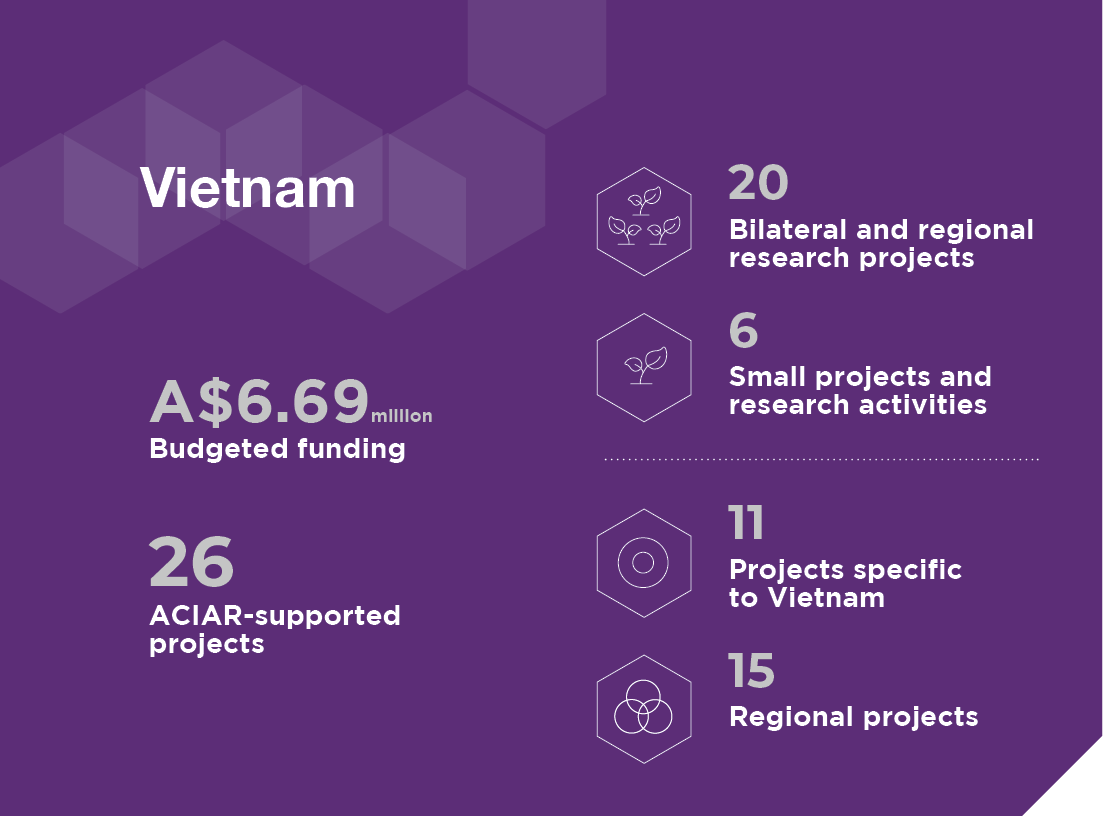Vietnam has achieved remarkable economic growth and poverty reduction through its market-oriented reform process (Doi Moi) since 1986. Agriculture has always been a key sector that contributes to the country’s food security, employment, export revenues, and rural livelihoods.
The importance of agriculture was again highlighted during the COVID-19 pandemic when it helped ensure food security and the economy’s stabilisation.
However, the sector still faces many challenges, such as land fragmentation, low productivity, environmental degradation, climate change, market volatility and its ability to expand to new export markets. Another issue is the development gaps of ethnic minorities and women in rural areas. To address these issues, the government has issued the Sustainable agriculture development strategy for 2021-2030 and vision to 2050, which aims to transform the sector
into a modern, green, and inclusive one that can compete globally and ensure national food security. The strategy has 6 main objectives:
- restructuring the sector based on local advantages, value chains and market demand
- enhancing productivity, quality, efficiency and sustainability of agricultural production
- developing rural areas with improved infrastructure, services and living standards
- strengthening resilience to natural disasters, epidemics and climate change
- protecting the environment and reducing greenhouse gas emissions
- promoting innovation, digitalisation and institutional reform in the sector.
To achieve these objectives, the strategy proposes a number of key measures, such as:
- reforming land policies to facilitate large-scale production and private investment
- improving access to finance, technology, information and markets for farmers and agribusinesses
- developing high-quality human resources and promoting social inclusion and gender equality
- investing in rural infrastructure, irrigation, logistics and public services
- enhancing disaster risk management and
climate-change adaptation and mitigation - strengthening legal frameworks, governance, and coordination mechanisms in the sector.
The strategy is aligned with Vietnam’s aspirations to become a high-income country by 2045 and its commitments to international agreements such as the Paris Agreement on climate change. It also reflects the lessons learned from the previous Agricultural Restructure Policy (2013–2020), which achieved some positive outcomes but also faced some limitations.
In the medium term, to further detail the strategy, the Vietnamese Government has recently endorsed several action plans, including plans for green growth, One Health and food systems.
The successful implementation of the strategy will require strong political will, effective coordination among stakeholders, adequate resources, and continuous monitoring and evaluation. ACIAR, as a trusted and long-term partner with Vietnam in agricultural research, will continue to contribute to the country’s agricultural development in the years to come.
Country priorities
ACIAR has sustained a program of research collaboration with Vietnam for the past 30 years. The strategy for research collaboration between Vietnam and ACIAR from 2017 to 2027 was developed on the basis of mutual acknowledgment that the relationship between ACIAR and Vietnam has evolved from donor–recipient to partnership and co-investment, and that Vietnamese research managers and researchers have played increasingly important and active roles in project design and implementation. The strategy confirms the desire of both parties to engage the private sector wherever possible to create opportunities for poorer residents in rural and urban areas through inclusive agribusiness systems. It also focuses on transformational opportunities for women in research and agribusiness systems and on farms.
The key ambitions of the strategy are to:
- develop long-term, equal and highly efficient partnership in research and technology development
- improve the agricultural research capacity of Vietnam for sustainable and equitable growth, especially in the 3 priority areas of the Mekong River Delta, the Central Highlands and the Northwest Region of Vietnam
- improve the skills, livelihoods and incomes of smallholder farmers, especially ethnic minorities and women, with a strong emphasis on building deeper knowledge of supply chains and stronger access to premium markets
- enhance human health and nutrition through research on integrated farming systems, nutrition-sensitive agriculture, food safety and
One Health - use natural resources more sustainably and efficiently in agricultural production, improving soil health and environmental outcomes while creating more-profitable production systems
- influence policies on managing climate-change impacts on agriculture.
In June 2022, Vietnam and ACIAR reaffirmed these priorities as being the key focus for our partnership. We also reaffirmed the commitment to:
- co-fund 75% of projects during the 10-year period
- develop research into climate change, especially drought-tolerant cropping systems in the Mekong River Delta and the Central Highlands, and saline-cropping systems for the Mekong River Delta
- continue investment in long-term capacity for Vietnam, including strengthening the roles of in-country ACIAR scholarship alumni, many of whom are leaders in science and policy.
2023–24 research program
The research program addresses our high-level objectives, as outlined in the ACIAR 10-Year Strategy 2018–2027, as well as specific issues and opportunities identified by ACIAR and our partner organisations.
The following table lists ACIAR-supported projects active in Vietnam during 2023–24.
Current and proposed projects in Vietnam, 2023–24

